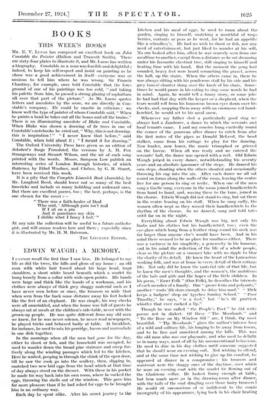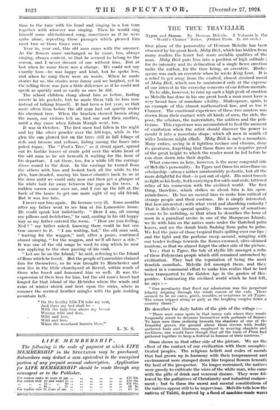• EDWIN WAUGH: A MEMORY.
I CANNOT recall the first time I saw him. He belonged to my life as did the trees, the hills and glens of my home : an old man with white hair tossed about his large head, huge shoulders, a short white beard beneath which a scarlet tic lmng loosely from a collar with wide-open points. His hands were large and thick like the handS of a workman, and his clothes were always of thick grey shaggy material such as I have never seen before or since, the trousers so wide that when seen from the back some distance away his feet looked like the feet of an elephant. He was simple, his rosy cheeks were all unwrinkled, and when the house was full of guests he always sat at meals at the children's side-table, never with the grown-up people. He was quite different from any old man we knew, for he was never solemn, he never read newspapers, he played tricks and behaved badly at table. At breakfast, for instance, he used to mix his porridge, bacon and marmalade in one dish together.
In the mornings when all the men had gone for the day, either to shoot or fish, and the household was occupied, he used to wander down the broad pine staircase and creep fur- tively along the winding passages which led to the kitchen. Here he waited, peeping in through the chink of the open door, till he saw the cook go into the scullery, then, slipping in, snatched two new laid eggs from the bowl which at that time of day always stood on the dresser. With these in his pocket he made his way back into his own room, where he sucked the eggs, throwing the shells out of the window. This gave him far more pleasure than if he had asked for eggs to be brought him in an ordinary way.
Each day he spent alike. After his secret journey to the
kitchen and his meal of eggs, he used to roam about the garden, singing to himself, snatching a mouthful of rasp- berries, currants or peas as he went, for he had an appetite - like a sehoolboy's." He had no wish to shoot or fish, nor any need of entertainment, but just liked to wander at his will. No one looked after him, often he was scarcely seen from one mealtime to another, except from a distance as he sat dreaming under his favourite chestnut tree, still singing to himself and beating time with his hand. But the moment the gong had sounded, heavy feet were heard scrunching the gravel, across the hall, up the stairs. When the others came in, there he was alWays sitting with his ponderous staff by his side and his grey tam-o'-shanter slung over the knob of his chair. Some- times he would pause in his eating to sing some words he had in mind. Again, he would tell a funny story, or some joke he had had that day with the keeper or a shepherd, when the tears would roll from his humorous brown eyes down over his cheeks, and, mopping them away with an enormous red hand- kerchief, he would set to his meal anew.
Whenever my father shot a particularly good stag we always had a Jamboree, a dance to which the servants and local tenants came. I and my cousins hung excitedly round the corner of the gunroom after dinner to catch from afar the first notes of the pipes as Donald McLeod, the head stalker, came from his cottage to play for the dancing. Now louder, now lower, the music triumphed or grieved on the breeze. When all was ready and we entered the servants' hall, the dance was opened with a reel. Old Edwin Waugh joined in every dance, notwithstanding his seventy years and an absolute ignorance of the steps. He danced his own steps, shouting when the others shouted and occasionally throwing his cap into the air. After each dance we all sat round on forms along the walls of the room, leaving the centre free for one person to sing or recite. When one of the men sang a Gaelic song, everyone in the room joined handkerchiefs from hand to hand, and, waving these to the tune, joined in the chorus. Edwin Waugh did not stand to sing, but sat there in the centre leaning on his staff. When he sang sadly, the women often wept as they waved their handkerchiefs to the rhythm of the chorus. So we danced, sang and told tales until far on in the night.
Everything about Edwin Waugh was big, not only his limbs and his clothes but his handkerchief, too ; even the eye-glass which hung from a leather strap round his neck was far larger than anyone else's would have been. And in his mind there seemed to be no place for smallness either. There was a vastness in his simplicity, a generosity in his humour, and in his mind the reflection of the life of a whole people, clear as the picture on a summer lake with no ripple to blur the clarity of its detail. lie knew the heart of the Lancashire working folk, and was at home in every detail of their cottage life. Not only did he know the material side of that life, but he knew the men's thoughts, and the women's, the ambitions of the lads and girls and the hopes of the little children. In his poem, " Eawr Folk " (Our Folk), he describes the interests of each member of a family. One " grows ferns and polyants," another " roots 'ith stars enough to drive him mad." " Aliek keeps a badgers' shop an' tqychcs Sunday School." " Poor Timothy," he says, " is a fool," but " he's th' prattiest whistler that ever cocked a lip."
Though he was called " the People's Poet " he did write poems not in dialect. Of these " The Moorlands " and " To the Rose on My Window Sill " are, I think, the most beautiful. " The Moorlands " gives the author's intense love of a wild and solitary life, his longing to be away from towns, and to be free and unnoticed among the hills. This was the old man who was our playmate, and who used to delight us in many ways, most of all by his unconventional behaviour. He used to dine in his day clothes until someone suggested that he should wear an evening suit. Not wishing to offend, and at the same time not wishing to give up his comfort, he appeared at dinner in a compromise : his trousers and waistcoat were the shaggy ones of the daytime, over which he wore an evening coat with the scarlet tie flowing out of the Gladstone collar. He looked funny enough at table, but how much wore .so in. the,. drawing-room after dinner, With thU tang of the coat dangling over those hairy trousers I He would sit unconscious of or indifferent to the conic incongruity of his appearance, lying back in his chair beating
. time to the tune with his -hand and singing in a low tone together with whoever was singing. Then he would sing
himself some old-fashioned song, sometimes as if he were quite alone, repeating those passages which pleased him most two or three times over.
Year in, year out, this old man came with the summer. As the flowers came unchanged so he came, too, always singing, always content, so that he seemed to belong to the season, and I never dreamt of one without him. But at last when he came there was a change. We could not say exactly how—he was happy and kind, but he spoke less, and when he sang there were no words. When he made stories for us, the stories were funny and we laughed, yet in the telling there was just a little difference as if he could not speak as quickly and as easily as once he did.
The school children clung about him as before, finding sweets in his pockets, but he made them talk to him now instead of talking himself. It had been a hot year, so that more often than before the old man had sat quietly under his chestnut tree. When the bracken showed brown along the moor, our visitors left us, first one and then another, until a day came when Edwin Waugh went, too.
It was in October. The first snow had fallen in the night and lay like silver powder over the hill-tops, while in the glen the sun glowed hot on the trees still in full foliage of reds and browns and yellows, fading among the limes into palest topaz. The " Poet's Tree," as it stood apart, spread out its fanlike leaves of crude gold over the white head of the old man as he sat beneath it waiting for the hour of his departure. I sat there, too, for a while till the carriage drove round to the door. In the carriage he turned from the others with him and looked back all the while to the
glen, bare-headed, waving his tam-o'-shanter back to us at the door until we could only now and then get a glimpse of his white hair far away between the gaps in the trees. A sudden sorrow came over me, and I ran up the hill at the back of the house to get one more sight of my old friend. But it was too late.
I never saw him again. He became very ill. Some months after my father went to see him at his Lancashire home. He could speak but indistinctly. " Here I am, all among my pillows and bedclothes," he said, smiling in his old happy way as my father entered the room. " How are you feeling, Ned ? " my father asked, knowing there could be but one true answer to it. " I am waiting, lad," the old man said, " waiting for the waggon," and, after a pause, continued almost singing, " for the waggon, and we'll all have a ride."
It was one of the old songs he used. to sing which he now . was applying to the slow passing of his soul.
" Let me lie on the Island," he said, referring to the Island of Rum which he loved. But the people of Lancashire claimed him for themselves, so he was brought to Manchester and now lies in the little churchyard at Kersal, within reach of those who loved and honoured him so well. It was the expression of their love for him. but the old man's heart had longed for that island of the Hebrides where the winds and rains of winter shriek and beat upon the rocks, where in summer the scented heather mingles with the pale nodding mountain bell.
" On the heathy hills I'll take my rest,
And there my bed shall be—
With the lady-fern above my breast Waving wild and free, Wild and free, Wild and free, When the moorland breezes blow."
L. N. S.



























 Previous page
Previous page